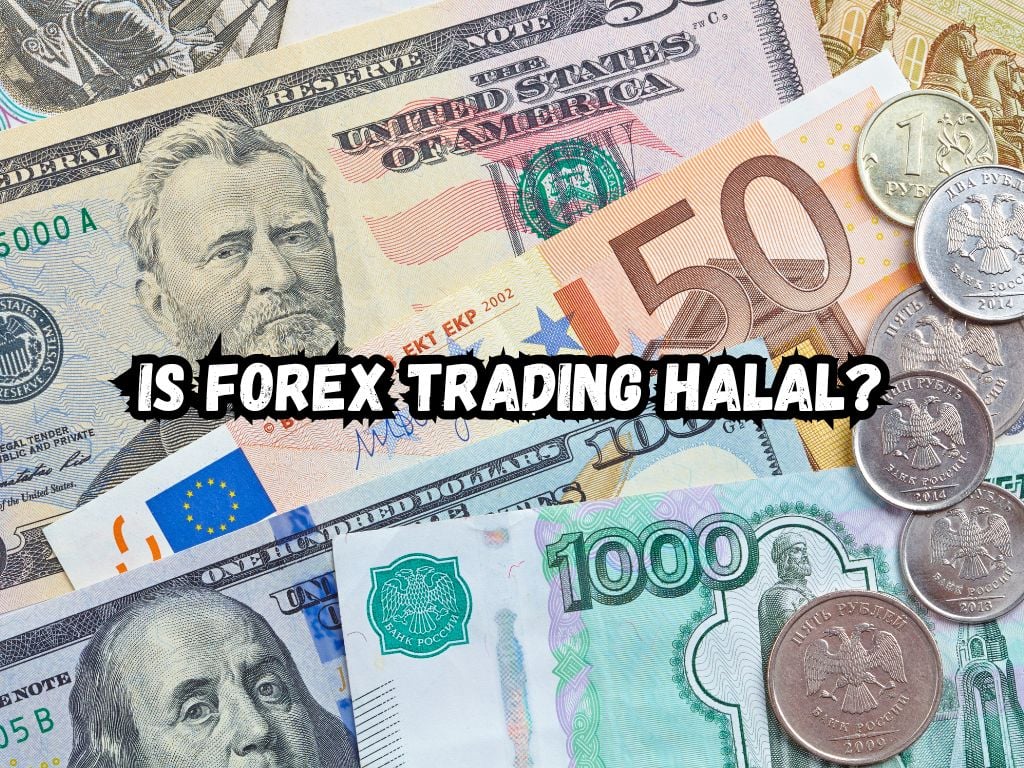In recent years, the question of whether Forex trading is Halal has become a topic of significant interest among Muslim investors.
The rise of online trading platforms has opened the door to the global foreign exchange market, where trillions of dollars are traded daily.
Given the significance of adhering to Islamic finance principles, it’s crucial for Muslim investors to understand, Is forex trading halal?
Understanding Islamic Finance Principles
Islamic finance is built on the foundation of promoting fairness and justice in financial transactions.
It strictly prohibits Riba (interest), Gharar (uncertainty or deception), and Maysir (gambling), aiming to create a financial system based on ethical values and social justice.
Key Concepts
Riba, the charging of interest, is strictly forbidden in Islam as it is considered unjust and exploitative. The concept of Gharar addresses the uncertainty and ambiguity in financial transactions, which is also prohibited.
Maysir, or gambling, involves earning money without working for it and is viewed as harmful and thus forbidden. Lastly, Zakat emphasizes the importance of charitable giving, ensuring wealth distribution among society’s needy.

Forex Trading and Islamic Finance
Forex trading involves the exchange of currencies on a decentralized global market. It’s known for its high liquidity and operates 24 hours a day.
While Forex trading offers opportunities for significant profits, it also comes with risks, often leading to concerns about its compatibility with Islamic finance principles.
The Nature of Forex Trading
Forex trading’s essence is the speculative buying and selling of currency pairs, hoping to profit from changes in exchange rates. It often involves leverage, which enables traders to control large positions with a relatively small amount of capital.
Forex Trading and Riba
One of the major concerns about Forex trading in the context of Islamic finance is the interest charged on leveraged positions, which could be seen as Riba.
This is particularly relevant when positions are held overnight, leading to swaps or rollover interests that conflict with Islamic law.
Speculation and Gharar in Forex Trading
The speculative nature of Forex trading raises questions about Gharar. Since trades are based on predictions of future market movements, the uncertainty involved might be considered a form of Gharar.
However, opinions on this matter vary among Islamic scholars.
Is Forex Trading Halal?
Given the concerns, the financial industry has introduced Islamic Forex accounts, also known as Sharia-compliant or no-riba accounts, which aim to address these issues.
Islamic Forex Accounts
Islamic Forex accounts are designed to eliminate interest components in trading activities.
They ensure that transactions are executed immediately, without delay, and without any interest-based swap or rollover fees, thus maintaining compliance with Islamic law.
Criteria for a Forex Transaction to Be Considered Halal
For Forex trading to be considered Halal, transactions must be conducted in a manner that avoids Riba and Gharar.
This includes immediate execution of trades, immediate settlement of transaction costs, and the absence of any interest-based fees or swaps.
Challenges and Considerations
Despite the availability of Islamic Forex accounts, Muslim traders face challenges in ensuring their trading activities are completely Halal.
Potential Areas of Concern
Traders must be wary of hidden fees that could contravene Islamic principles. Moreover, distinguishing between legitimate trading strategies and those that fall into the realm of gambling can be challenging.
Seeking Guidance
To navigate these complexities, it’s critical for Muslim traders to seek guidance from Islamic scholars knowledgeable in finance. Their insights can help ensure that trading activities remain within the boundaries of Islamic law.
Pro Tips for Ensuring Your Forex Trading Is Halal
To maintain compliance with Islamic finance principles, traders should carefully select Islamic Forex brokers that are reputable and transparent.
Continuous self-education on Halal investing principles and regular consultations with experts in Islamic finance can also provide valuable guidance.

Frequently Asked Questions
Can Muslims participate in online Forex trading?
Yes, Muslims can participate in Forex trading, provided they use Islamic Forex accounts and adhere to Islamic finance principles.
What makes a Forex broker ‘Islamic’ or ‘Halal’?
An Islamic Forex broker offers Sharia-compliant accounts that eliminate interest components and comply with Islamic finance principles.
How do I convert my regular Forex account into an Islamic account?
Many brokers allow the conversion of regular Forex accounts into Islamic accounts by submitting a request. However, the process may vary between brokers.
While Islamic accounts eliminate interest-based fees, traders should be vigilant about other potential charges and ensure they comply with Islamic law.
Can hedging be considered Halal in Forex trading?
Hedging strategies can be Halal, provided they are used appropriately and avoid elements of speculative gambling or uncertainty (Gharar).
By carefully navigating these considerations, Muslim investors can engage in Forex trading in a way that harmonizes with their faith and financial aspirations.
Conclusion
While Forex trading presents a modern financial avenue for earning profits, it’s essential for Muslim investors to ensure their activities align with Islamic finance principles.
By understanding the nature of Forex trading, utilizing Islamic Forex accounts, and seeking expert guidance, Muslim traders can participate in the global Forex market in a manner that is both profitable and Halal.


 Tags:
Tags:










